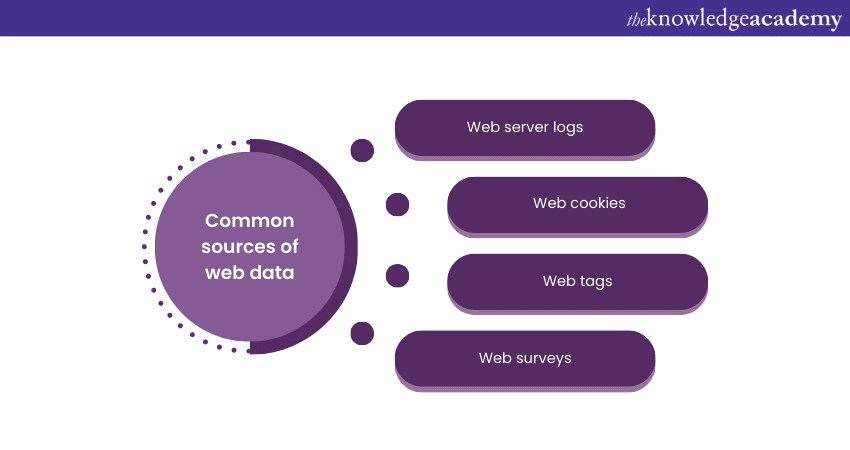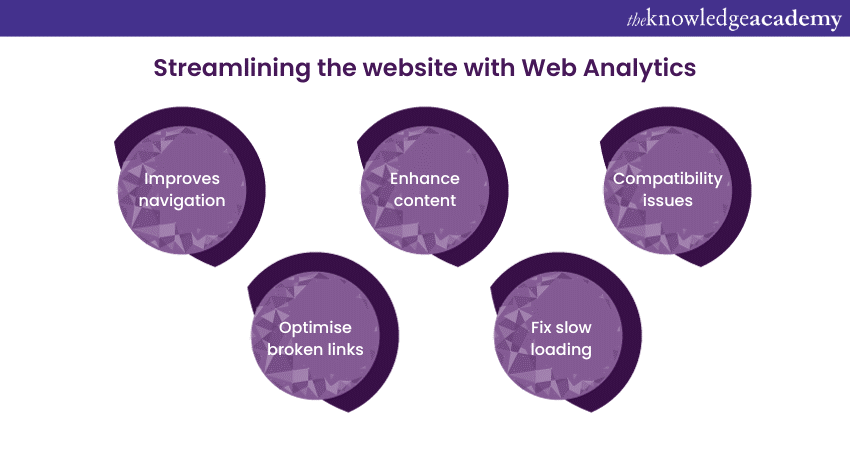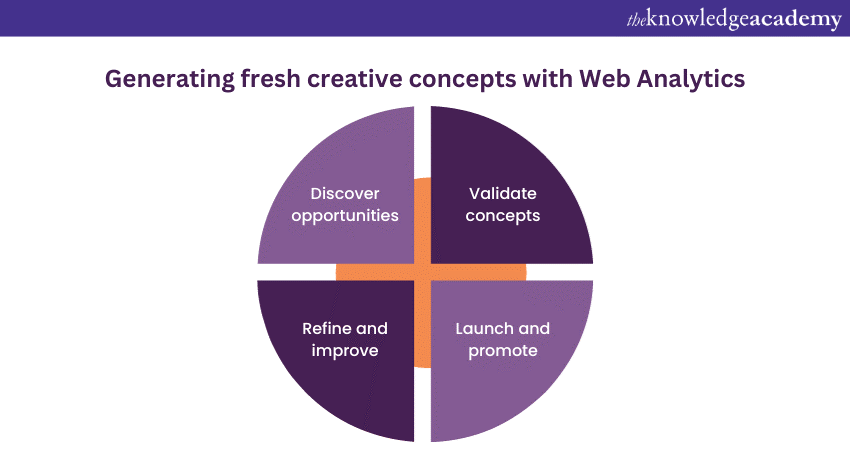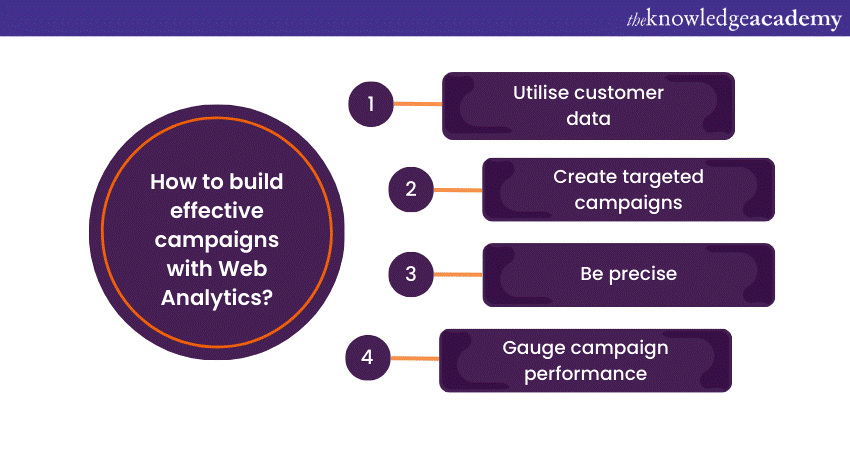We may not have the course you’re looking for. If you enquire or give us a call on + 1-866 272 8822 and speak to our training experts, we may still be able to help with your training requirements.
Training Outcomes Within Your Budget!
We ensure quality, budget-alignment, and timely delivery by our expert instructors.

Web Analytics is the technique of collecting, analysing, and reporting data about the behaviour and performance of your website and its visitors. It can help you understand how people find your site, what they do on it, and how they interact with your content and offers. There are many Benefits of Web Analytics and understanding them is crucial to succeed in today’s world.
Web Analytics can also help you measure the effectiveness of your marketing campaigns, identify areas of improvement, and test new ideas. In short, Web Analytics can help you make data-driven decisions that can boost your online business. In this blog, we will explore 15 key Benefits of Web Analytics and how they can help you achieve your online goals. Let’s dive in!
Table of Contents
1) What is Web Analytics?
2) What are the Benefits of Web Analytics?
a) Monitoring online traffic
b) Assessing bounce rates
c) Enhancing and monitoring marketing campaigns
d) Identifying and targeting the right audience for capitalisation
e) Enhancing and streamlining the website
3) Conclusion
What is Web Analytics?
Web Analytics is a branch of Data Analytics that focuses on web-based data. It uses various tools and methods to collect, process, and present data about your website and its visitors. Some of the common sources of web data are:

1) Web server logs: These are files that record every request and response that occurs on your web server, such as page views, downloads, errors, etc.
2) Web cookies: These are small pieces of data that are stored on your visitors’ browsers, which can track their preferences, behaviour, and identity across multiple sessions and sites.
3) Web tags: These are snippets of code that are embedded on your web pages, which can send data to third-party services, such as Google Analytics, Facebook Pixel, etc.
4) Web surveys: These are online forms that ask your visitors for feedback, opinions, or information, which can help you understand their demands, preferences, and satisfaction.
Web Analytics tools can aggregate, filter, and analyse the data from these sources and present them in various formats, such as dashboards, reports, charts, graphs, etc. These tools can also help you set and track key performance indicators (KPIs), such as traffic, conversions, revenue, etc.
What are the Benefits of Web Analytics?
Web Analytics can provide you with many benefits that can help you grow your online business. Let’s explore the 15 Benefits of Web Analytics:
1) Monitoring online traffic
Web Analytics allows online businesses to monitor the quantity and quality of their website traffic. They can see how many visitors their site attracts, where they come from, how long they stay, and what pages they visit. They can also see how their traffic changes over time, such as daily, weekly, monthly, or seasonally.
This helps them understand the trends and patterns of their website’s performance and popularity. They can also compare their traffic with their competitors’ or industry benchmarks to see how they stand in the market.
2) Assessing bounce rates
Bounce rate is the percentage of people who leave a site after viewing only one page. It is an indicator of how engaging and relevant a site is to its visitors. A high bounce rate means that a site is not meeting the expectations or needs of its visitors, and they are not interested in exploring more of its content or offers. A low bounce rate means that a site is attracting and retaining its visitors, and they are likely to take further actions on the site.
Web Analytics helps online businesses measure and analyse their bounce rate and identify the factors that influence it, such as page load speed, design, layout, content, etc. They can then use this information to improve their site and reduce their bounce rate.
3) Enhancing and monitoring marketing campaigns
Web Analytics helps online businesses plan, execute, and evaluate their marketing campaigns, such as email, social media, SEO, PPC, etc. They can use Web Analytics to set their campaign goals, such as traffic, leads, sales, etc., and track their progress and performance. They can also use Web Analytics to measure their return on investment (ROI) by calculating the cost and revenue of their campaigns.
Web Analytics also helps online businesses optimise their campaigns by testing different variables, such as headlines, images, copy, keywords, etc., and measuring their impact on their results. They can then use the data and insights from Web Analytics to refine their campaigns and improve their outcomes.
4) Identifying and targeting the right audience for capitalisation
Web Analytics helps online businesses understand who their visitors are, what they want, and how they behave. They can use Web Analytics to segment their visitors based on various criteria, such as demographics, location, device, browser, etc. They can also use Web Analytics to create personas, which are fictional representations of their perfect customers based on their characteristics, needs, preferences, and goals.
They can then use Web Analytics to target their audience with personalised and relevant content and offers based on their segments or personas. This can help them increase their conversion rates, customer loyalty, and customer lifetime value.
5) Enhancing and streamlining the website
Web Analytics helps online businesses improve the design, functionality, and usability of their website. They can use Web Analytics to identify the strengths and weaknesses of their site, such as navigation, layout, content, features, etc.

They can also use Web Analytics to find and fix any errors or issues that may affect their site’s performance, such as broken links, slow loading, compatibility, etc. They can then use Web Analytics to test and implement changes that can enhance their site and make it more user-friendly and appealing. This can help them improve their site’s quality, speed, and accessibility and provide a better user experience for their visitors.
6) Conversion Rate Optimisation (CRO)
CRO is the process of improving the number of visitors who take a desired action on a site, such as signing up, subscribing, buying, etc. CRO is one of the main goals and Benefits of Web Analytics, as it can help online businesses generate more value from their existing traffic. They can use Web Analytics to measure and analyse their conversion rate and identify the factors that affect it, such as landing pages, calls to action, forms, etc.
They can also use Web Analytics to run experiments, such as A/B testing, multivariate testing, etc., to compare different versions of their site elements and see which ones perform better. They can then use the data and insights from Web Analytics to optimise their site and increase their conversion rate.
7) Monitoring and achieving online business goals
Web Analytics helps online businesses define, monitor, and achieve their online business goals, such as increasing awareness, generating leads, boosting sales, etc. They can use Web Analytics to create and track specific and measurable objectives, such as page views, downloads, registrations, purchases, etc., that are aligned with their business goals.
They can also use Web Analytics to assign values to their objectives, such as revenue, profit, customer satisfaction, etc., that reflect their business outcomes. They can then use Web Analytics to measure and evaluate their performance and progress towards their goals and see how well they are meeting their expectations and standards. They can also use Web Analytics to identify and overcome any challenges or gaps that may hinder their success.
8) Enhancing results from Google Ads and Facebook Ads
Web Analytics can help you leverage the power and potential of Google Ads and Facebook Ads, which are two of the most popular and effective online advertising platforms. You can use Web Analytics to generate and manage your ad campaigns, such as choosing your keywords, audience, budget, etc. You can also use Web Analytics to observe and optimise your ad performance, such as impressions, clicks, conversions, etc.
You can also use Web Analytics to analyse your ad ROI by calculating the cost and revenue of your ads. Web Analytics can also help you integrate your ads with your website and other marketing channels, such as email, social media, etc., to create a seamless and consistent user journey and experience.
Elevate your marketing insights with our Web Analytics Masterclass – Sign up now!
9) Ease of getting started
Web Analytics is not as complicated or intimidating as it may seem. In fact, it is quite easy and simple to get started with Web Analytics, thanks to the availability and accessibility of various Web Analytics tools and resources. Online businesses can use free and user-friendly Web Analytics tools, such as Google Analytics. These tools can provide them with a comprehensive and reliable overview of their web data and insights.
They can also use online tutorials, guides, blogs, videos, courses, etc., to learn the basics and best practices of Web Analytics and how to use them for their online business. They can also join online communities, forums, groups, etc., to connect with other Web Analytics users and experts and get support and advice.
10) Generating fresh creative concepts
Web Analytics can help you generate fresh and creative concepts for your online business, such as new content, products, services, features, etc. You can use Web Analytics to discover and explore new opportunities and ideas based on your web data and insights. You can also use Web Analytics to validate and verify your concepts by testing them with your audience and measuring their feedback and responses.

You can also use Web Analytics to refine and improve your concepts by incorporating the data and insights from your tests and experiments. Web Analytics can also help you launch and promote your concepts by measuring and optimising their performance and impact.
11) Consolidate your website data
Web Analytics can help you consolidate and integrate your website data with other sources of data, such as CRM, ERP, email, social media, etc. This can help you create a holistic and comprehensive view of your online business and its performance. You can also use Web Analytics to generate and automate reports and dashboards that can display and visualise your data in various ways, such as tables, charts, graphs, etc.
This can help you simplify and streamline your data analysis and presentation and make it easier and faster to access and share your data and insights with your team, stakeholders, and customers.
12) Directs you towards your intended audience
Web Analytics can help you direct your website and its content towards your intended audience by optimising your site for social media and search engines. You can use Web Analytics to research and select the best keywords, titles, descriptions, tags, etc. This can help your site rank higher and naturally acquire additional traffic from search engines like Google and Bing.
You can also use Web Analytics to generate and share engaging and shareable content, such as blogs, videos, infographics, etc., that can help your site generate more social media traffic from platforms such as Facebook, Twitter, Instagram, etc. Web Analytics can also help you measure and analyse your search and social media performance and optimise your site and content accordingly.
Uncover the secrets of SEO with our SEO Masterclass – Sign up today!
13) Enables your business to monitor customer behaviour
Web Analytics can help you monitor and understand your customer behaviour, such as how they find, use, and interact with your website and its content and offers. You can use Web Analytics Metrics to track and analyse various metrics and indicators of customer behaviour, such as page views, time on site, scroll depth, clicks, downloads, etc.
You can also use Web Analytics to map and visualise your customer journey, which is the path and process that your customers follow from their first visit to your site until their final purchase or action. Web Analytics can also help you identify and segment your customer groups, such as new, returning, loyal, etc., and understand their needs, preferences, and motivations.
14) Offers actionable insights to enhance customer experience
Web Analytics can help online businesses offer a better customer experience, which is the overall impression and satisfaction that their customers have with their website and their online business. They can use Web Analytics to collect and analyse feedback and ratings from their customers, such as surveys, reviews, testimonials, etc., and understand their pain points, expectations, and suggestions.
They can also use Web Analytics to test and improve various aspects of their customer experience, such as usability, accessibility, design, functionality, content, etc., and see how they affect their customer satisfaction and loyalty. Web Analytics can also help them personalise and customise their customer experience by offering relevant and tailored content and offers based on their customer segments or personas.
15) Build effective, customer-driven marketing campaigns
Web Analytics can help online businesses build effective, customer-driven marketing campaigns, which are marketing campaigns that are based on their customer data and insights and aim to meet their customer needs and goals. They can use Web Analytics to create and implement marketing strategies and tactics that are aligned with their customer segments or personas. This helps target them with the right message at the right time and through the right channel.

They can also use Web Analytics to measure and evaluate their marketing campaign performance and impact. This helps them see how well they are reaching and engaging their customers and how well they are converting them into leads, sales, or loyal customers.
Conclusion
We hope you read and understand the Benefits of Web Analytics. It is a powerful and essential tool for any online business, as it can help you collect, analyse, and use data to grow your website and your online business. Web Analytics can provide you with many benefits, such as monitoring traffic, assessing bounce rates, optimising conversions, targeting the right audience, and more. By using Web Analytics, you can make data-driven decisions that can provide you with a competitive edge in the digital world.
Empower your marketing skills with our Marketing Courses – Sign up today!
Frequently Asked Questions
Upcoming Digital Marketing Resources Batches & Dates
Date
 Web Analytics Course
Web Analytics Course
Fri 10th Jan 2025
Fri 14th Feb 2025
Fri 11th Apr 2025
Fri 23rd May 2025
Fri 8th Aug 2025
Fri 26th Sep 2025
Fri 21st Nov 2025







 Top Rated Course
Top Rated Course



 If you wish to make any changes to your course, please
If you wish to make any changes to your course, please


